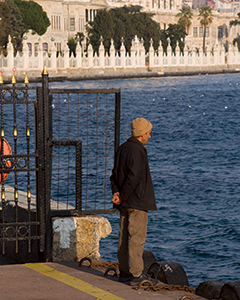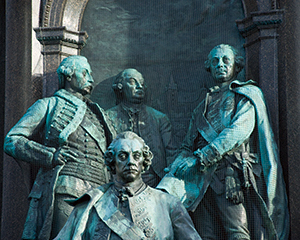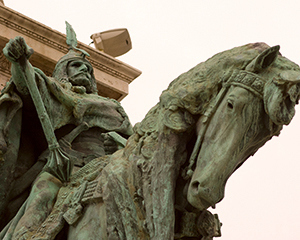James Lockhart Perry's Blog, page 15
September 15, 2015
Cat Flight From Birdland
Mama never did bake him cookies, but somewhere along the way, the beautiful underworld courier Mathilde Durand must have taught her son Alec how to cover his tracks and flee from trouble.
Handy skills for a Hollywood B-movie producer who responds to his partner’s double-cross by stealing their $9,999,900 in seed money. Especially when the Bulgarian mobster who provided the funds comes looking for him—not to mention when the Bulgarian’s masters in The Consortium lose patience and start murdering everyone in sight.
The action in this romance-disguised-as-adventure drives Alec and his misnamed cat-lover Nellie out of Hollywood to Bruxelles, Lugano, Mexico City, Manhattan, and deep into the California desert.
 Available in paperback and eBook from Amazon.
Available in paperback and eBook from Amazon.Cat Flight From Birdland
90 Days of Lies, Love, and Self-Discovery
January

01/01

A pair of birds has landed in the garden. Both are jet black, with dull orange beaks and specks of coal for eyes, too small to be crows and skittish to the point of irrationality. They rip at the rough, yellow moss that plagues the wedge of shade underneath the enormous European White Birch in the back left corner. Their wings heave and shudder, as they plant scrawny talons and seek purchase to wrench some poor, ignorant earthworm from its muddy lair. They work as a pair of dull and determined hit men—hit birds?—until the slightest sound sends them scuttling across the lawn and through the air to the sanctuary of a tree.
This is no happy-go-lucky couple, flitting, fluttering, and crooning at each other in their high-pitched, squeaky voices. And small wonder, for there are three cats—one gray striped tabby, one calico, and one hugely overweight—pregnant?—black with shocking yellow eyes—who lord over the contiguous and well hidden nineteenth-century block of townhouses where I hide. The cats have called the shots around here ever since the morning a year ago when I arrived in the violent whirlwind of a North European snowstorm—called the shots, that is, until two nights ago, when a hysterical feline shriek rent the air, followed by three weak gasps of descending audibility—and all of the cats vanished.
If this were North America or the frozen wastes of Russia, one might call in the wolves and coyotes for questioning. But this is civilized Bruxelles, in Belgium, in what has recently been dubbed the European Union Quarter. The last four-legged wild carnivore left its footprint on the cobbled surface of this neighborhood two hundred years ago in a futile flight from the maw of the French Revolution. I’ve repeatedly circumnavigated this enclosed block of European-style suburbia and established beyond a doubt that there exists no way in or out for animal or human predators, except through the securely locked doors and garages of the Belgian bourgeoisie and Eurocrats who populate my neighborhood. And it’s safe to assume that none of those respectable burghers were out on that eerie, moonless night, murdering cats.
But the cats have indeed vanished, and the birds appear quite happy about it. As I write these lines, the original pair of blackbirds has been joined by a pigeon, a pair of non-descript browns, and a thrush.
In the cat world, this passes for ominous.
01/02

If the reporter from the Los Angeles Times—Dan Cronin, as I recall—were still paying attention, he’d write that three hundred sixty-six days ago, I ambled out of a Hollywood New Year’s Eve party with an exotic blond on my arm and vanished into thin air. But Dan isn’t paying attention, and neither are the authorities. Nor is the haphazardly coiffed and irritated Malibu resident who petitioned the Superior Court of Los Angeles six months ago to declare her long lost ex-husband deceased. As far as I can tell, no one is paying attention, and this is good news.
It’s a neurosis of our hyper-communicative modern life that we suspect strangers of watching us. Every time we venture down a city street, we pass through a gauntlet of security cameras and swivel-necked policemen feigning alertness. In the newspapers, we read endless reports of geosynchronous spy satellites and ultra-sophisticated computer programs designed to snatch our very own private conversations out of the ether. Spy and mystery novels, magazine articles, and neurotic movies all assure us that we individually matter enough to be watched. But of course, we don’t. And like I said, this is good news.
At Dan’s urging, the authorities spent a good two months searching for the blond who supposedly fled that New Year’s Eve party with me. Whoever she was, she didn’t know me, we didn’t even exchange a look. The police asked the host of the Hollywood love fest, a mover-shaker by the name of Joe Rhymes, to supply a list of all of the blonds who drove away from his mansion that night. No doubt, Joe chortled in reply and served up the female half of the Hollywood phonebook. At any rate, and as far as I know, no blond starlet or script reader ever stepped forward with the tiniest allusion to my seductive powers.
My buddy Joe shouldered his social responsibilities and co-operated with the investigation, but judging by the news reports, his enthusiasm never set any records. Six long months after my disappearing act, he organized the sparsely attended memorial service and somehow talked my ex-wife into dusting off her veil and photogenic regrets. In a thoroughly ingenious touch, Joe allotted $1,000 from our corporate insurance policy to inscribe my name on a bench in the memorial park just off Avalon harbor on Catalina Island. After all, we’d shared so many memories of the cove nearby, where we anchored every summer, drank ourselves silly, screwed our fill of blond starlets, and pondered the chilly waters where Natalie Wood and I supposedly drowned.
Unfortunately, I remember none of those hilarious escapades, and neither does Joe, at least not anymore. Less than a month after I was declared legally, if ambiguously extinct, an anonymous burglar broke into Joe’s house, sabotaged the alarm, stole a trinket or two, and left no grain of doubt concerning Joe’s fate. The execution-style murder brought Dan Cronin back into the picture, but neither he nor the sleuths of Los Angeles Homicide produced a plausible scenario. Suddenly, everyone loved Joe in precise, if indirect proportion to the strength of their alibis. My earlier disappearance and a gossamer thread of underworld connections notwithstanding, the news of Joe’s thinly lamented demise floated to the bottom of the gossip pages like a muddy rock in the cesspool of Los Angeles society.
All good news.
01/03

I hate crows. Since early yesterday, I’ve accumulated a pile of stones next to the French doors that give out onto the garden in the hope of catching one of the brutes unawares. There are two of them, both newcomers, intensely stupid and unfriendly creatures with hideous, off-key voices. I’m no ornithologist and give little credence to their erudition and supernatural qualities, but have made a mental note to dust off my Edgar Allen Poe. To the best of my recollection, I’ve never murdered a single living being, not even an insect, but would gladly grant these obnoxious creatures an exemption. They must suspect my intentions. As keenly as they eye the tasty treats in the garden, they’ve thus far clung to the tops of a neighbor’s pines.
Those pines and my tall, leggy birch have just caught the tail end of a random and bitter gust off the North Sea. This is newsworthy. After a nasty bite or two in December, winter has shuffled off to Sweden and left the Low Countries in an impossibly balmy lull. I’ve actually spotted strollers and sunbathers in the manicured lawns of a local park. Anyone who has made the acquaintance of the North Sea might be forgiven for reading these lines with a snort of disbelief, but it is so.
Even in the worst of meteorological hissy fits, the property where I sit rarely sees any wind action at all. It’s a matter of architectural history. For the uninitiated, Belgium is the most invaded country on earth. Two thousand years of marauding Romans, Franks, Spaniards, Austrians, Frenchmen, and Germans have left the Belgians a suspicious and protective folk. They rarely talk to strangers and almost never invite new friends home for dinner. Even the authorities despise the authorities—everyone else just ignores them. Tax evasion is an art. So is minding one’s own business. In the countryside, this has created a landscape littered with ancient fortified farms and abbeys. In the cities, the near-universal preference is for enclosed and contiguous blocks of tall brick-and-stone townhouses. Defiant, impenetrable, anonymous, and rather like me.
My mother bought this property in 1963, in one of her perfectly logical bouts of historical paranoia. She paid cash and—with the aid of friends from her wartime resistance exploits—managed to thoroughly obscure the ownership. Not that anyone was then promoting the species of pogroms and persecutions that have plagued European history—but you never knew. Human beings have never come up short of new excuses to kill each other—we all belong to one group of potential victims or another. But thanks to the shady, mistrustful instincts of one Mathilde Durand, the $9,999,900-Thieves segment of the population has spent the last year in this Bruxelles suburb in apparent security.
Still no sign of the cats.
01/04

The last time I saw Joe Rhymes, he was busy embarrassing himself in a corner of his vast living room at the Hollywood New Year’s Eve party he hosted where I theoretically gave up the ghost. This was an unusual event, in that Joe had tossed aside his normally exclusive list and invited everyone he knew. It was a frigid night by Los Angeles standards, moonless and unfriendly, when Joe flung open the sliding glass doors of his cliff-top in the Hollywood Hills. By the time I arrived, around 11:45PM, tuxedoed and solo, no one was suffering from the cold.
A quick glance through the house confirmed me as the only sober funster in the neighborhood. There must have been two-hundred-plus of the glitterati and assorted sycophants and hangers-on. A few would’ve brought the gossip rags trailing after them, except that the paparazzi were busy mobbing the diversionary soiree Joe had announced for the Roosevelt Hotel. I must have been planning something—subconsciously, at least—because I parked outside Joe’s gates beyond the reach of his valet service and entered on foot by a side entrance.
In the thick crowds that clogged the foyer of Joe’s mansion, I found the answer to my most vexing and immediate question. Up the circular stairway, past the ersatz artwork I suspected Joe of buying wholesale and outside a wedding-cake of a bedroom door, stood a pair of silent thugs I’d recently met. Perhaps met is too strong a word—conversation was out of the question in the obscure language they spoke, and we never exchanged so much as a threatening grunt or frown. But their presence now informed me that Joe had indeed invited the Bulgarian to this love fest. And that invitation revealed, at least to my paranoid imagination, that Joe and I had indeed taken on a partner in my latest movie. Or more precisely, that Joe had taken on a partner and cut me out.
I was already severely irritated, and the vision of Joe across a hallway in the next sitting room did nothing to lighten the vindictive impulse that had driven me there. He was playing his favorite game, a variation on hide and seek, where he hid his true self long enough to gain someone’s trust and then popped out of the bushes to skewer the victim with their own secret confidences.
Just then, Joe sat sloppily wedged into a leather sofa and an audience of six, relating the hilarious details of a starlet who’d tried to seduce her way into his affections in order to further her career. This was no covey of deep-thought intellectuals. The worn-out Hollywood clichés that spouted from Joe’s mouth met with knowing nods and grins, at least among the men. If the three women chortled along a little less reliably, it might’ve had to do with the language Joe used to describe the cunt’s—his word, not mine—antics. Even Joe normally eschewed such language, but in the haze of a half-dozen scotches and doting grins, he must have found verbal immunity.
One of the women who endured the story was a B-movie actress named Lauren—or Laura, I wasn’t sure which—whom we’d tested for one of our more forgettable movies and roles. Lauren looked particularly frazzled by the events Joe was relating. This made sense, once I recognized her as the thinly disguised heroine of the tale. Lauren couldn’t very well climb to her drunken feet and escape, for as Joe had no doubt surmised, this would’ve opened up the possibility of her thin disguise evaporating behind her back. So she sat there and took it, swallowing every ounce of dignity her Midwestern parents had ingrained in her, until I walked up and held out my hand.
“Lauren, come here,” I suggested a little too strongly, if only to penetrate the alcoholic haze that enveloped the group. “I have to show you something.”
“Hey buddy,” Joe protested warily. “Her name’s Laura, and she’ll be there in a minute. I was just telling a story.”
“No doubt. We’ll be right back.”
Laura made no move to follow me, but taking advantage of her inebriated confusion, I pulled her up and out of the group.
“Stay out of the master bedroom!” Joe called after us, as we wound away across the room, but that was exactly where I was headed. “Get her to show you the Japanese thing,” he added helpfully.
“Do I know you?” Laura asked from a foggy never-land somewhere between relieved and horrified. Frankly, my dear, I didn’t give a damn. If she was stupid enough to tolerate Joe’s spiteful games, it wasn’t my problem. My problem was how to get into the master bedroom without giving rise to a host of questions. Thanks to Laura, we were on our way.
We were half-way up the back staircase off the kitchen—and far removed from the bedroom door the Bulgarian’s thugs guarded—when it dawned on my conquest that she’d forgotten to negotiate a suitable pay-off for the sheer ecstasy she was about to provide. I mumbled something about the next Gone with the Wind—I was never very good at negotiating sex with starlets—and gently spun her through a short corridor and into Joe’s inner sanctum.
Joe must have been drunk out of his mind. Either that, or he and the Bulgarian had suffered a monumental miscommunication. I hadn’t the slightest doubt that I could crawl far enough into Joe’s head to figure out the combination of his programmable safe or the passwords he used to protect the innermost secrets of his laptop. But as it happened, no such skills were required. For on the corner of the rich maroon silk bedspread sat two enormous duffle bags. And in those enormous duffle bags was packed the princely, if no doubt inaccurately counted, sum of $9,999,900. All of it immaculately bound, stacked, and laundered.
Laura obliged me by passing out on the bed. Elsewhere in the mansion, a volcano of drunken cheers erupted. Happy New Year indeed. My New Year’s resolution? To never, ever again underestimate the stupidity of East European gangsters and cut-rate Hollywood bullshit artists.
 Available in paperback and eBook from Amazon.
Available in paperback and eBook from Amazon.Filed under: Novels Tagged: Belgium, California, Italy, Mexico, New York, Switzerland

September 14, 2015
The Messenger
Meet Mike Miller, Messenger Extraordinaire, the man with the tightest lips in America. Mike has made millions in the hyper-secret, slightly seedy Messenger business. His gorgeous wife Tuesday is the hottest TV News personality in Los Angeles. Life bumps and grinds along, until Mike’s paid too much money to deliver a message to a Wyoming beauty queen who’s been dead twenty years. But posthumous message delivery turns out to be the only halfway sane assignment in this dangerous and convoluted job. Boston, Salt Lake City, Jackson Hole, Manhattan, San Pedro, and even Hong Kong zoom by in this zany romance-disguised-as-adventure.
[image error] Available in paperback and eBook from Amazon.
The Messenger
A Philosophical Fairytale
Part I

Confucius
Chapter 1

I love my wife.
Yes, it sounds corny and insipid and a weak plank to plunge off into a dime-store thriller, but it’s true, and I don’t care, so there it is. Tuesday’s the one good thing to happen to me in the last twenty years. She’s put up with nearly everything I’ve dished out.
No, we’re not talking about womanizing. I just chase a dollar that wedges awkwardly into a middle class existence. The work is uneven, the hours bizarre, the hazards as odd as they are unexpected. If only Tuesday had asked me before hiring a divorce attorney, I might have tossed it all for the love of a good woman.
If it wasn’t for the money maybe. The money is definitely a sometime thing. Not to mention the secrecy and the slavish gratitude of a satisfied customer. Not to mention the travel and expense accounts, the glitzy hotels and restaurants, the fine French … whatever.
Okay, so maybe Tuesday isn’t the only good thing to happen to me in the last twenty years, but on the night of Wednesday, December 6, 2003, in the middle of a driving Boston blizzard, I might have been forgiven for thinking so.
I was waiting for a client in the Lurking Leprechaun, a dingy Irish bar just off Quincy Market where tourists the world over come to watch true Irishmen at play. There were even a few of the old sods on duty, although I couldn’t figure out where the tall black man with the fedora and goatee fit in. I was wearing the brown and tan herringbone jacket, and this was important because it allowed me to stand out for a prospective client without terrifying the children. No one east of Pittsburgh wears brown and tan to a Boston Irish bar, but in the dark, polluted atmosphere of that hellhole, you had to look really close to get more than mildly offended.
What set me off on a sentimental journey over Tuesday was the blond on the muted television. The soothsayers of American cable pseudo-news were yet again pawing through the private guts of the United States citizenry. The latest overcooked scandal concerned a nearly literate football player from USC. The University of Southern California lies twenty-four miles north of my beach house in San Pedro, but I’ve never attended a game and lose little sleep over the sexual orientation of a twenty-year-old Heisman Trophy candidate. But the cable anchor was interrogating a luscious blond reporter perched on a bicycle ramp by a palm tree outside the Los Angeles Coliseum. The blond looked less than thrilled by her role in the privacy invasion, but it didn’t matter to me. Suddenly, inexplicably, from three thousand miles away, swallowed up in a swamp of stale tourist beer, amid an ocean of dreary snow, I wanted her.
Yes, I did, I lusted after her, and I wasn’t the only one. The drunk at the end of the bar hauled his swollen eyes ceiling-ward and choked on a catcall. The black man under the fedora nodded sagely and fingered his goatee. The woman from Iowa sneered with disgust at the man from Iowa and his delusions of life after Iowa women.
“It’s all a show,” a nearby connoisseur opined over his fifth pint of Guinness. “She’s standing in front of a green screen while they run the scene in the background. Look at her. She’s an airhead, all tits and ass.”
“She’s a journalist!” I countered a mite defensively. “She probably works her tail off. And the caption says she’s live.”
“You believe everything you see?” Knowing chortles rippled up and down the bar. Here and there, a precious dollop of beer spilled over the rim of a delirium-trembling glass.
“The screen says she’s live!” I wailed. “What’s the matter with you all?”
What was I, a confirmed teetotaler in the authentic, hatchet-wielding, Carry A. Nation tradition, doing there anyway? I collected the change from a Shirley Temple and backed away from the river of dirty suds on the bar. The blond vanished, but I wasn’t done with her. What kind of client would insist on meeting me in a decrepit hellhole like this? Knowing sneers followed me past the graffiti on the door to the horrifying blizzard outside. The bitter cold flash-froze my fingers, as I fumbled with my cell phone and punched in its favorite number.
“What do you want?” The voice was curt and sleepy, but it was only four PM in Los Angeles.
“I want to make love to the blond on the television, the one with the immaculately conceived boobs. I want to wrap those luscious legs around—”
“Where are you? Did you sign the papers?”
“Boston, remember? I told you I was on a job. What are you doing home? The TV said you were live.”
“I am alive, which is more than I can say for you, if I don’t get that f—ing quit claim!”
Ouch. Tuesday is a true Texan cheerleader, sex kitten, and delightful raconteuse who only uses foul hyphens under extreme circumstances. She paused for effect. She knew what she did to me. I strained to hear her breathing over the racket of falling snow. I could just picture her in the golden sunset of San Pedro, lying there on the bamboo chaise in the living room in her slinky black silk…
Never mind.
“I’ll sign the papers, don’t worry,” I promised. “I’ll be home tomorrow.”
“Oh no you won’t. I changed the locks and bought a dog.”
“What kind of dog?”
“A vicious one. I want that f—ing quit claim. Why Boston?”
Ouch, ouch, and ouch again. “You know I can’t talk about it. Confidentiality is the only thing that keeps me in business. Clients—”
“Blah, blah, blah.”
“Seriously!”
“You wouldn’t tell Jesus himself the time of day!”
“I told you where I was, didn’t I? You said yourself I was getting better!”
“Stop whining, Mike. Take it like a real man. Go out and buy yourself thirty seconds of meaningless sex.”
“Cabots and Lodges! They don’t do that here.”
“Don’t do what?” a deep voice behind me inquired.
I spun in surprise. Icy fingers pitched Tuesday into a nearby snow bank. It was the tall black goatee in the fedora. I shook in the frigid cold and hoped like hell he wasn’t my next client. “Don’t tell me you’re Confucius,” I prayed aloud.
“Confucius I am not,” the man smiled. “But I do believe the man on the phone asked me to use that name.”
I’m really not this incompetent. Tall buildings might stretch my leaping skills, but within the bounds of self-delusion, I operate at an intense and effective pitch. Some of the time anyway.
“You spotted the brown and tan herringbone,” I assumed.
“It wasn’t easy inside,” he admitted. “Out here it makes me want to reach for the milk and cereal bowl.”
“Let’s go someplace else,” I suggested. It was going to be a long climb to credibility.
“Don’t worry about it,” Confucius say. “I’ve seen what I came to see.”
Shades of enigmatic clouded his eyes. If a predator hid in there somewhere, I couldn’t spot it. I had sensed the delicate obscurity of the man over the phone, when those soft, reassuring vocal chords tickled at the Zen in my neuroses and prompted me to alias my latest client after that ancient Chinese harmonizer. At least they both sported handsome hats and beards.
Confucius reached into his coat pocket and withdrew an envelope. “Fifteen thousand dollars and a last known address. Think that’ll cover it?”
“I would imagine.” Holy cow was the breed that came to mind, even if it was the wrong religion. “What’s the message?”
“Is it true you did some work for John Gotti?”
“Never heard of the man.”
“The Oppenheimer family?”
“Who are they?”
“What about Ivan Boesky?”
The irritation spewed from my mouth like bits of frozen enamel. “Why do people keep bringing him up?” It wasn’t my fault that the infamous Wall Street scam artist had wintered a few seasons in Lompoc as a guest of the United States Government. And all the way back in 1986, for God’s sake! “If Boesky wasn’t so cheap, he never would’ve gone to jail. What’s the message?”
“Tell my wife I’m sorry.”
“You don’t need me for that. Even I don’t need a messenger to talk to my—”
“Tell her I’m sorry I had to kill her.”
[image error] Available in paperback and eBook from Amazon.
Filed under: Novels Tagged: California, Hong Kong, Massachusetts, New York, Wyoming

January 28, 2014
Rancho Palos Verdes
 Emanuel Swedenborg was an odd dude even by the standards of the early 18th century that produced him. An acute and incisive scientific mind, he produced a string of remarkable insights into topics all the way from metallurgy and flying machines to neurons, pituitary glands, and the cerebral cortex. But he lived at a time when science and magical spirituality were still being disentangled from each other, so he lost no credibility when God appeared to him and gave him free and unlimited passage through heaven and hell. The resulting revelations, contained in Heaven and Hell and The Heavenly Doctrine, formed the basis of one of the more polite and democratic, if eccentric sects of the Christian church. Like most odd sects, the ultra-respectable Swedenborgians converted a handful of their fellow Swedes before finding their true footing in sect-happy America.
Emanuel Swedenborg was an odd dude even by the standards of the early 18th century that produced him. An acute and incisive scientific mind, he produced a string of remarkable insights into topics all the way from metallurgy and flying machines to neurons, pituitary glands, and the cerebral cortex. But he lived at a time when science and magical spirituality were still being disentangled from each other, so he lost no credibility when God appeared to him and gave him free and unlimited passage through heaven and hell. The resulting revelations, contained in Heaven and Hell and The Heavenly Doctrine, formed the basis of one of the more polite and democratic, if eccentric sects of the Christian church. Like most odd sects, the ultra-respectable Swedenborgians converted a handful of their fellow Swedes before finding their true footing in sect-happy America.
One of the more eccentric architectural families of the 20th century were the Wrights of Chicago and Los Angeles. Frank Lloyd Wright dispensed with any formal architectural education to become the greatest architect in American history. As such, he designed Fallingwater in Stewart Township, Pennsylvania, a wobbly house that many nevertheless consider the single most important design of the 20th century. Fallingwater epitomized Wright’s concept of Organic Architecture, where buildings are designed to blend into, rather than dominate, their environments. The philosophy thoroughly influenced Wright’s first son, known to all as Lloyd, another genius without formal education who started in landscape architecture and took his background with him into building design.
The result, shown here, is the Wayfarer’s Chapel on the cliffs of Palos Verdes above the Pacific Ocean. Lloyd planted a mini-forest around the spectacular, if tiny, glass-walled church with the intention of allowing the spiritual and physical worlds to blend seamlessly and harmoniously–and exactly the way the Swedenborgian clients claimed they should. Today, there is no better niche on the planet to experience a Pacific-style ocean storm in all its wonder and beauty, although most people settle for getting married in this ultimate lover’s chapel. Just make sure you reserve months in advance–the ultra-nice and egalitarian Swedenborgians will stage weddings for any denomination of any faith, and the place stays busy all year.
Filed under: Travels Tagged: California, Travel

January 24, 2014
Ypres
 The British Tommies called it Wipers in World War I, when they and the Anzacs and Canadians fought five murderous battles here against an enemy they called the Hun. First Ypres in October and November of 1914, Second Ypres in April and May of 1915, Passchendaele from July to November in 1917, The Lys in April of 1918, and Fifth Ypres in September and October of the same year.
The British Tommies called it Wipers in World War I, when they and the Anzacs and Canadians fought five murderous battles here against an enemy they called the Hun. First Ypres in October and November of 1914, Second Ypres in April and May of 1915, Passchendaele from July to November in 1917, The Lys in April of 1918, and Fifth Ypres in September and October of the same year.
No one really knows how many died in these conflicts, if only because so many were simply vaporized without a trace, but it numbered somewhere in the low millions. Ypres formed the Western end of the great flanking movement that started out as the much vaunted Schlieffen Plan and then petered out as the Race to the Sea. A race the British and Belgians ultimately won, because once the German armies were bottled up by the Allies and the English Channel, it was only a matter of time and vast body counts before the war had to end badly for their Empire.
We’ve spent more than a month total driving the World War I battlefields of southern Belgium and northern France, searching for evidence of the war beyond the random civic monuments and military graveyards that dot the landscape. The shocking truth is, the conflict has all but disappeared. At the western end, the forests above Verdun are littered with overgrown shell holes and signs that warn you to keep to the paths lest you step on the pulverized bones of the unknown thousands. But here, off Route N8 just east of Ypres, lie the only trench works we’ve been able to find, and they are a tacky, Disneyland-on-the-cheap embarrassment with a café, tourist shop, and just enough of an admission price to insult the fallen.
And yet World War I still kills and maims farmers, soldiers, and tourists alike–including an eight-year-old girl named Maité Roël, who will receive a 70-euro pension and half-price railway tickets for the rest of her life in compensation for the leg she recently lost while building a campfire with an unexploded artillery shell she mistook for a log. Nearly 100 years since the first conflict here at Ypres, one of the braver detachments of the Belgian Army (Dienst voor Opruiming en Vernietiging van Ontploffingstuigen, or DOVO) continues to dig up and destroy more than 200 tons of unexploded munitions each year. In the four years of the war, the Allied and Entente powers flung more than 1.6 billion shells at each other–just along the Western Front–so there is still no end in sight.
Oh well…
Filed under: Travels Tagged: Belgium, Travel

January 22, 2014
Talamone
 American history buffs will recognize the cliché from the plethora of plaques and monuments up and down the eastern Atlantic Seaboard that announce that “George Washington slept here.” The Italians harbor a similar attachment to the peripatetic Giuseppe Garibaldi, who, judging by plaques and monuments, appears to have slept and fought in every village on the peninsula. This fort outside Grosseto, for example, claims to have been the Great Liberator’s base of operations during the i Mille Expedition–even though he only spent one night here provisioning his ragtag army.
American history buffs will recognize the cliché from the plethora of plaques and monuments up and down the eastern Atlantic Seaboard that announce that “George Washington slept here.” The Italians harbor a similar attachment to the peripatetic Giuseppe Garibaldi, who, judging by plaques and monuments, appears to have slept and fought in every village on the peninsula. This fort outside Grosseto, for example, claims to have been the Great Liberator’s base of operations during the i Mille Expedition–even though he only spent one night here provisioning his ragtag army.
Garibaldi and Washington share a number of characteristics, most famously that both were Republicans who disdained the power and riches thrust upon them by a grateful population and retired instead to their farms and agricultural experiments. Both were Renaissance Men, although the list of Garibaldi’s occupations dwarfs Washington’s–from seaman, merchant marine captain, and Admiral through schoolmaster, farmer, and novelist, to revolutionary, soldier, General, and reluctant statesman. Neither man won very many of his battles, but instead wore down the enemy by the same sheer force of personality that galvanized and held together his armies and nation.
One place the great men differed was in their choice of women. Washington took the safe route in his marriage to the wealthy widow Martha Custis and remained more or less faithful to her throughout his travels. Garibaldi was a ladies’ man whose wife Anita (Ana Maria de Jesus Ribeiro di Garibaldi) rode, sailed, and fought right alongside her husband from South America to Sicily and up the spine of Italy to Ravenna, where she took a break from all the struggle to die of malaria. It was a romance for the ages and thoroughly in keeping with the spirit of il Risorgimento.
If Garibaldi’s attachment to this village and fort was fleeting, Hollywood (or at least the English Pinewood equivalent) appears to have made up for it in the movie Quantum of Solace. MI6 compensates for doubting and torturing Rene Mathis (played by the great Giancarlo Giannini) by buying him this very fort for a retirement home, along with the comely Gemma (Lucrezia Lante della Rovere) to keep him company. It’s hard to imagine the flamboyant red-shirted Gaucho Garibaldi disapproving.
Filed under: Travels Tagged: Italy, Travel

January 20, 2014
Doel
 The first thing you notice in this village on the Scheldt Estuary east of the port city of Antwerpen is the shops, restaurant, and hotel–there aren’t any, and anything that resembles a civic structure is boarded-up and ready for demolition. Then you notice that the only other human beings are outsiders like you, running around and snapping photos of the ghost town. Then you turn a corner and come upon this nuclear plant cooling tower spewing steam over an ancient windmill on the polder, and you immediately get that Chernobyl feeling in your bones and crawling along your skin. How the hell did the Belgian government let you wander in here?
The first thing you notice in this village on the Scheldt Estuary east of the port city of Antwerpen is the shops, restaurant, and hotel–there aren’t any, and anything that resembles a civic structure is boarded-up and ready for demolition. Then you notice that the only other human beings are outsiders like you, running around and snapping photos of the ghost town. Then you turn a corner and come upon this nuclear plant cooling tower spewing steam over an ancient windmill on the polder, and you immediately get that Chernobyl feeling in your bones and crawling along your skin. How the hell did the Belgian government let you wander in here?
But it turns out that no, this isn’t a nuclear catastrophe, but the next worst thing–a European bureaucracy run amok. The port authorities, the Flemish Executive, and the money men behind them decided in 2008 that the Port of Antwerpen needed to expand, and if this 800-year-old village got in the way, too bad. If the authorities couldn’t pay the citizens to leave, they would send in demolition teams backed by riot police and simply destroy the village right under their feet.
Fortunately, the 200 Doelers have been able to fight back with that quintessential 21st-century weapon, publicity, and bring the port and its thugs to their knees. As they rightly point out, the current harbor isn’t even close to capacity, and there is already plenty of room for expansion within its current footprint. But in a script straight out of the pages of Kafka, the logic of human welfare is irrelevant, and all that matters to the port at this point is the exercise of its power without reference to the human beings it affects.
The Scheldt Estuary does in fact make this area one of the great natural harbors of the world, and the vast Flemish Plain behind it makes a perfect staging point for reaching the entire northern European market. So much so, that the Austrian, Spanish, and Dutch lords who ruled Flanders through most of its history spent considerable energy suppressing the trade here in favor of the city of Rotterdam upriver in the Netherlands. The price of Belgian Independence in 1830 was a virtual shutdown that lasted until the British Army arrived here in World War II and discovered the area’s natural strengths. So it’s no wonder that the Port of Antwerpen authorities come unhinged when anyone stands in the way of their expansion. But in the modern era, nothing is ever that simple.
If you read Dutch, the citizens of Doel will gladly chew off your ear at their website.
Filed under: Travels Tagged: Belgium, Travel

January 17, 2014
Beşiktaş
 The palace in the background here on the European shore of the Bosporus (the Dolmabahçe Sarayi) represents an anomaly in modern history, in that Mustafa Kemal Atatürk died here on 10 November, 1938, and left his country a social and political legacy that persists to this day.
The palace in the background here on the European shore of the Bosporus (the Dolmabahçe Sarayi) represents an anomaly in modern history, in that Mustafa Kemal Atatürk died here on 10 November, 1938, and left his country a social and political legacy that persists to this day.
Vladimir Ilyich Lenin’s vision for the Soviet Union barely outlasted his death in 1924. The Germany that followed Adolf Hitler was fortunately the same middle class society that preceded him. The Franklin Roosevelt administration might have transformed America into a statist, socially mature society, but then Roosevelt had plenty of support for his views. Atatürk was too far ahead of his time to derive much support from anywhere except his own iron will and vitality, and yet, in just fifteen years, he turned Turkey and its history and culture upside down. And happily for everyone, it has stayed that way.
It is near-impossible to grasp the catastrophe Atatürk inherited. The Ottoman Empire had long collapsed into a vicious, empty shell, easily manipulated by outsiders, and in which the Turk found himself a second-class citizen. Atatürk started out in the Army, a complete mess if ever there was one, and yet with brilliant generalship, managed to defeat the best of the British Empire at Gallipoli. His secret there, as later in his politics, was that he possessed a unique understanding of the Turk and all his strengths and weaknesses. All of Atatürk’s successes built on this foundation at a time when most of the world and even his own countrymen had written off Turks and Turkish society as hopelessly lost.
To the extent that history is a product of personality, many of Atatürk’s policies originated from the simple love of a good fight. One fight he picked with his country was over all forms of religious dress, which he banned out of hand. Not just the headscarf people are still fighting over, but the Fez, the veil, and anything else he took as evidence of the slave mentality he intended to strip from his people’s collective consciousness. For the same reasons, he fully and instantly emancipated women long before more so-called progressive societies got around to fulfilling their wartime promises.
Not everything was perfection–Atatürk couldn’t spell economics, and many of the other ethnic groups who populated the Anatolian and Thracian geography had reason to regret the Turk’s ascendancy. The polyglot Constantinople Atatürk inherited was probably more interesting than the more homogenous Istanbul he left behind. And all of the battles it took to free and transform the country involved far too much bloodshed all around. Yet the result is evident to anyone who visits Turkey, one of the few stable and successful societies and democracies in this part of the world.
As Atatürk himself once told a friend and aide, not bad for a Macedonian drunkard with a weakness for Raki and loose women.
Filed under: Travels Tagged: Travel, Turkey

January 6, 2014
East Boston
 We were shocked to learn today that the East Boston Immigration Station has been demolished. Billed on its opening in 1920 as Boston’s Ellis Island, the hideous yellow box at the tip of Jeffries Point in Boston Harbor only processed around twenty-three thousand immigrants before its closing in 1954. For the most part, it handled “difficult” cases, with a steady trickle of souls headed either into or out of the country.
We were shocked to learn today that the East Boston Immigration Station has been demolished. Billed on its opening in 1920 as Boston’s Ellis Island, the hideous yellow box at the tip of Jeffries Point in Boston Harbor only processed around twenty-three thousand immigrants before its closing in 1954. For the most part, it handled “difficult” cases, with a steady trickle of souls headed either into or out of the country.
One famous resident was the swindler Charles Ponzi, who waited here for his deportation to Italy. Another was Edith Berkman, the Communist union organizer awaiting a boat back to Germany. Another was Dr. Karl Otto Lange, arrested in his Harvard offices the day after Pearl Harbor as an enemy alien. Dr. Lange hung on with his adopted country and eventually found fame in teaching glider dynamics and training monkeys for trips to outer space.
In the summer of 1972, Lockhart lived a few blocks away on the bony finger of the Point in one of these walk-up tenement houses. All day and most of the night, Logan Airport roared through the front window while the Bethlehem Shipyards on the harbor clanged away at the back. Our favorite skinny-dipping hole was the dock off the end of the ruined and shuttered Immigration Station just under the main Logan runway, where we would climb through the fence, strip off our clothes, and wait for the jets to blow us into the water. It is a miracle that we survived the ecological disaster that was Boston Harbor–but then, this was 1972, with college ending and Vietnam beckoning, and no one gave much of a damn.
An amazing photograph from the cover of the Boston Globe of 24 December, 1922, shows rows of perplexed immigrants in the cage on the roof of the Station following their American minder in a daily regimen of calisthenics. Silly as it looks today, it is the gentlest of reminders that America really is, and always has been, all about hope, freedom, and the promise of a new start in life. Not the easiest standards to live up to, but as a country and a community, we at least seem to keep trying.
Filed under: Travels Tagged: Massachusetts, Travel

Wien
 Not even we can fall in love with everywhere we travel, and Vienna has always been an ambiguous experience.
Not even we can fall in love with everywhere we travel, and Vienna has always been an ambiguous experience.
First, the Hapsburgs. There is nothing particularly heroic in the way they built the empire here–through marrying off their children to boobs like Louis XVI of France and cynically manipulating peace conferences after other countries took the brunt of the fighting. Judging by how ill-prepared Marie Antoinette was for her fate as Queen of France, it’s hard to escape the conclusion that the only part of her that mattered was her child-bearing mechanism.
All empires are built on the long-suffering backs of innocents, but in the Hapsburg’s case, the administration seems to have been unusually ill-tempered, persnickety, and even parasitic. You don’t have to like Napoleon Bonaparte to admire the way he brought modernization along on his conquests, but it’s hard to see what the Hapsburgs ever offered their Serb or Hungarian, much less Belgian subjects.
And then there was the Anschluss of 1938, when Lockhart’s step-mother, a 14-year-old Jew, was hounded out of town into two years of sheer terror wandering the roads of Europe one step ahead of the Nazis. At the end of the war, she returned to her fine house in Vienna to find it owned and occupied by a former neighbor. “What are you doing here?” the woman demanded rudely at the door. “You’re supposed to be dead!” Somehow the meager lifetime pension coughed up by the Austrian government seems inadequate.
Still, the cakes are nice, although we think the Germans do a better job of Schwarzwaldkuchen, and the celebrated Sachertorte is really just soft gingerbread with whipped cream. The roasted chicken at the original Wienerwald used to be world-class, although in the last few decades, they seem to have morphed into a fast-food chain.
Most countries erect monuments to their great military and civil leaders–here, it seems to have been a matter of which ego had the cash to foot the bill. In our not-so-humble opinion, the smug faces on this monument in Vienna reek of an undeserved self-satisfaction. As you can see, the gentlemen are covered in netting to prevent the birds from decorating. We say, take away the nets and let the pigeons have at them.
And by the way, nothing we say here applies to the rest of Austria. We love the place, and would very comfortably live here. It’s just the last four hundred years of Hapsburg and wartime Vienna that gets our goat.
Filed under: Travels Tagged: Austria, Travel

Budapest
 The Magyars who overran the Carpathian Basin and settled here around the first Millenium were fast, brutal, clever, smallish raiders on light horses with minimal armor whose use of the new innovation, spurs, allowed them to plunder and outmaneuver enemies as far away as the Iberian peninsula. So when we find a heavily armored Árpád fixed to an enormous medieval charger, as in this statue from Hősök tere (Hero’s Square) in downtown Budapest, we have to wonder, why the rewrite of history?
The Magyars who overran the Carpathian Basin and settled here around the first Millenium were fast, brutal, clever, smallish raiders on light horses with minimal armor whose use of the new innovation, spurs, allowed them to plunder and outmaneuver enemies as far away as the Iberian peninsula. So when we find a heavily armored Árpád fixed to an enormous medieval charger, as in this statue from Hősök tere (Hero’s Square) in downtown Budapest, we have to wonder, why the rewrite of history?
Construction of Hero’s Square, it turns out, was started in 1896 at the height of the Austro-Hungarian Empire. The original monument even included a Hapsburg or two, although after the World War II bombing, the Magyars replaced the interloping foreigners with proper Hungarian patriots. Like so many Balkan tribes, the Magyars have found themselves at the whip end of one clash after another of the great European powers. Their one attempt to climb aboard with a winner, the imperial union with Austria of 1867, ended in the disaster of the Treaty of Trianon of 1918, when their country was dismembered, and a third of their people were flung off into the diaspora. The authentic Árpád, leader of the seven scrappy, mobile tribes who wrenched this basin from its previous occupants would have made a far more potent symbol of the Hungary of the quixotic 1956 Revolution.
The Magyars, incidentally, are an ethnic anomaly in the heart of Europe. Biologically, their closest relatives are the Baltic Finns a thousand miles to the north. As with so many other nationalities, the largest Hungarian nation outside the motherland itself is the United States. Trivial as it sounds, our favorite Hungarian is Goldie Hawn, who brilliantly played a fake Hungarian waitress in the 1992 Steve Martin movie, Housesitter. And our friend Louis of Los Angeles, who can cook an entire Hungarian feast without a drop of the thick “Hungarian” Goulash we Americans actually derived from the Austrians.
Filed under: Travels Tagged: Hungary, Travel




